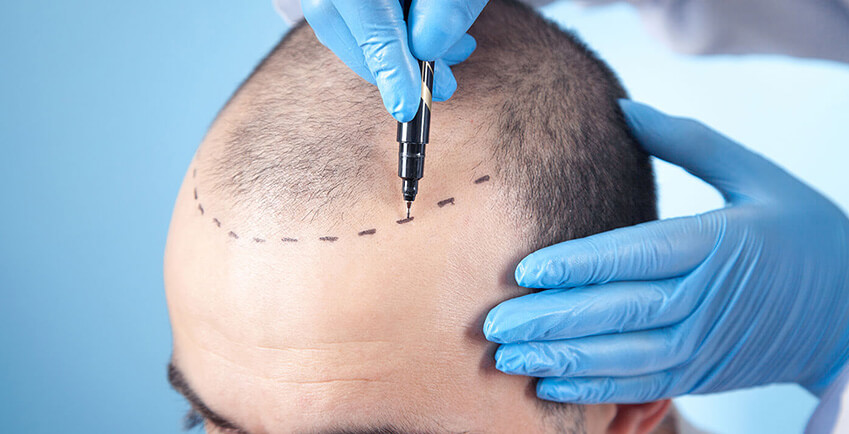Like a game of chess, each pawn, bishop, and knight matters — every move counts when it comes to your scalp’s safety.
Hair loss, especially when it starts young, can feel like an invisible thief — slowly stealing your confidence, your identity, even the way you look at yourself in the mirror. The promise of regaining what’s lost through a hair transplant sounds almost magical. But here’s the catch: Hair transplant isn’t just about regaining your crown. It’s about protecting your health, your safety, and your future.
As a plastic surgeon, I often tell my patients — “Just like in chess, winning isn’t about placing the crown on the king’s head. It’s about every move, every strategy, every minor detail that goes into protecting that crown.” In a similar way, a successful and safe hair transplant isn’t about simply getting grafts implanted. It’s about choosing the right surgeon, the right clinic, and asking the right questions.
Let me walk you through what really matters.
- Don’t Choose Your Surgeon Like You Choose a Barber
You wouldn’t get your heart surgery from some love-guru on FM (though he claims he knows everyone’s heart), would you? Then why treat a surgical procedure like a haircut?
A hair transplant is a surgery. It involves anaesthesia, tissue handling, vascular supply, graft survival, sterility, and post-op care. It’s not a salon service.
Before choosing a surgeon:
- Check their qualifications. Are they a board-certified plastic surgeon or dermatologist? Look for certifications from recognized national or international medical boards.
- Ask how many years of experience they have — not just in aesthetic practice, but specifically in hair restoration surgery.
- Look at real results from real patients — not just Instagram filters and promotional before-after photos. Ask for in-person reviews or patients you can talk to.
- The Clinic’s Hygiene Isn’t Just About Clean Floors
Would you eat street food from a stall that has cockroaches running under the table? Probably not. But what if I told you, some people get hair transplants in places worse than that?
Here’s what to check when you walk into a clinic:
- Sterile operation area: A proper hair transplant should happen in a clean, sterile, surgical operation theatre – not in a fancy spa room with LED lights and music.
- Trained assistants: Are the assistants trained or just helpers wearing gloves?
- Disinfection protocol: Do they use sterilized instruments for you? Are disposables really “disposable” after each case?
- Power backup and emergency equipment: If something goes wrong (yes, it can), is the clinic prepared?
If a clinic cuts corners on hygiene, they’re likely cutting corners on safety too.
- Your First Consultation Should Feel Like a Doctor’s Visit, Not a Sales Pitch
When you walk into a clinic, the first person you talk to should not be a “counsellor” or “advisor” in fancy clothes, but the doctor themselves.
A real consultation means:
- Discussing your complete medical history — diabetes, thyroid, any autoimmune disease, or medications you take.
- Discussing surgical history or healing problems — like if you’ve ever had hypertrophic scarring or keloids.
- Family history of baldness — so the surgeon can predict your future hair loss pattern and plan wisely.
- Checking your scalp health — sometimes the donor area (back of head) isn’t strong enough, and your surgeon must tell you this upfront.
Red Flag Alert: If someone promises “guaranteed results” without even examining your scalp, walk away. No ethical doctor guarantees outcomes in biology.
- Medical Honesty Is a Two-Way Street
Sometimes, patients are hesitant to share everything — “Oh, I had dengue two months ago, but I’m okay now,” or “I pop a steroid cream for my scalp itching every now and then.” These things matter.
Just like your doctor must be honest with you, you must be honest with them. Withholding information can lead to:
- Poor graft survival
- Excessive bleeding
- Poor healing or scarring
- Complications under anaesthesia
Think of it like boarding a flight — if you’re allergic to peanuts, wouldn’t you want the airline to know before they serve you lunch?
- Hair Transplant Negligence: A Growing Epidemic
We’re living in a time where Instagram ads can look more convincing than degrees. The number of unqualified “hair transplant factories” in India is alarming. They lure patients in with low prices, fake testimonials, and glossy clinics — but behind the scenes, the procedures are often performed by unlicensed technicians or untrained staff.
Here are the dangers:
- Infections — Hepatitis B, C, even HIV, from reused needles.
- Botched results — unnatural hairline, visible plug marks, poor density.
- Scalp necrosis — when tissue dies due to poor technique or compromised blood flow.
- Shock loss — irreversible loss of existing hair because the transplant was too aggressive.
One of my patients once came in to correct a transplant done in another city. The hairline was too low, the density was patchy, and worst of all, the donor area had been over-harvested. He paid less initially but ended up spending three times more trying to fix it — not to mention the emotional cost.
- Red Flags You Should Never Ignore
Before you say “yes” to a clinic, ask yourself:
- Did I meet the doctor personally JUST before surgery, and not for consultation?
- Was I rushed into a discount package with “limited time offer”?
- Did they avoid giving me written consent or details of the surgery plan?
- Are the technicians doing most of the procedure while the doctor just walks in briefly?
- Do they refuse to discuss risks or talk only about results?
If your answer is “yes” to even one of these, pause.
A safe surgery is not about speed or glamour. It’s about doing it right.
- Choose Long-Term Safety Over Short-Term Vanity
I often tell my patients — “You’re not just investing in your hair. You’re investing in your safety, confidence, and peace of mind.”
Would you let a stranger tattoo your face without checking their background? Then why risk your scalp?
A well-done, safe hair transplant by a qualified surgeon doesn’t just restore hair — it restores trust in your body. But a poorly done one can leave permanent damage, both physical and psychological.
Final Thought: Think Like a Chess Player
Hair transplant isn’t a quick fix. It’s a well-planned journey. Every move — the surgeon you choose, the hygiene you demand, the honesty you maintain, the safety protocols you look for — matters.
Don’t fall for glitzy ads or cheap deals. Demand medical ethics. Ask questions. Prioritize safety.
After all, in this game of crown, your life is the king — and it deserves to be protected.
Dr.Yash Thakkar
Mob: 7447433723
IAAPS :- 2024/GJ/51
Mail: Dr.yashthakkar.plasticsurgery@gmail.com
Disclaimer : The opinions here are personal views of the authors. IAAPS is not responsible. All members may not have the same scientific view point

